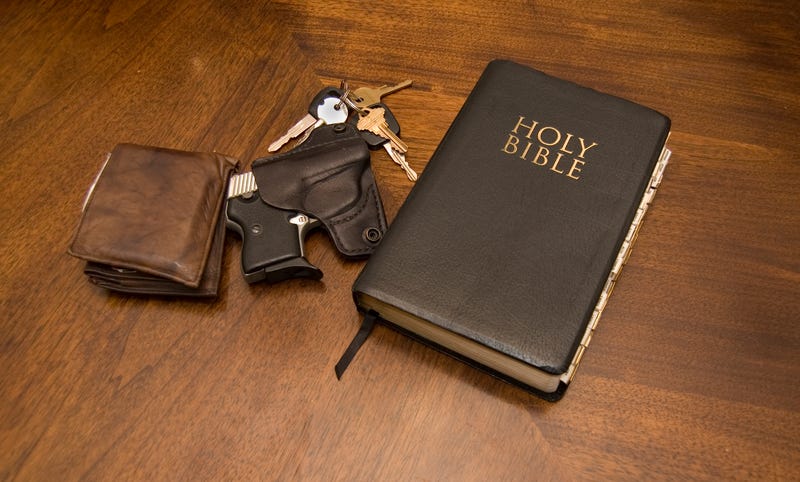
Buffalo, N.Y. (WBEN) - A federal judge in Buffalo on Thursday issued a temporary restraining order, blocking part of a New York State law that makes it a crime for people to carry guns in places of worship.
This case sees a U.S. District Judge siding with two Buffalo area clerics teaming up with two gun rights organizations who sued and sought a temporary restraining order to stop the enforcement of the law while the case proceeds.

New York lawmakers re-wrote the state’s gun laws this summer after the U.S. Supreme Court invalidated the state’s century-old system of granting permits to carry handguns outside the home. Among the provisions of the new law was a ban on guns in places of worship and other locations deemed “sensitive.”
Many of these changes and installments of gun control laws and other measures have come in the recent months after several mass shootings across the country. Here in Buffalo, many of those conversations are particularly fresh following the racially motivated mass shooting at the Tops Friendly Market back on May 14 on Jefferson Avenue.
For many churches across the region, it will be a discussion that is brought up among the congregation before, during and also following service.
"Many mass shootings throughout the country, and a number of them in houses of worship of different types, I think that this is a question that obviously comes up," said Fr. Paul Seil from Our Lady of Perpetual Help in Buffalo. "Historically, no guns were allowed or weapons have ever been allowed in the Catholic Church. I'm talking about centuries ago, it was seen as a place of refuge and a place of peace, where you could go and, if you had to, you could actually find some type of protection there. But that's kind of gone out the window, in a lot of ways."
"I think the real talking point is for people to feel safe. People sometimes just don't feel safe in their own homes, in their stores and parking lots, in their neighborhoods, even in their schools," said Fr. Robert Zapfel from St. Leo the Great in Amherst. "There's been so much in the paper the last couple of days about the security measures that the public schools are instituting right away. It really speaks, I think, to a need for all of us, certainly, to be aware of our surroundings and the possible dangers in our surroundings. But I think also just to be reminded that violence is not an answer, and it just perpetuates the cycle of violence if we react violently to violent situations. So as a person of peace, who tries to promote peace and injustice as well, I think that everyone is concerned about their own personal safety, and they have to take measures to make sure that whenever they're in public, and for their own homes, that they feel safe."
For some local clerics, there has been concern over the years for the well-being of members of the church, especially when it came to people trying to steal any financial offerings from churchgoers in attendance. While state lawmakers may have been attempting to rectify the changes to the state's gun laws after the Supreme Court handed down their decision, some feel the legislature didn't do their due diligence.
"Normally I would support the legislature, but in this instance, we've had the ability in New York for as long as I can remember - I'm certainly not as old as the gun law - to the arm members of the congregation for the purposes of securing the financial offerings that we raise in our congregations until lately," said Rev. Kinzer Pointer from Liberty Missionary Baptist Church in Buffalo. "What this did was this criminalized those officers of the church, who had been licensed for the purposes of being able to conduct those financial businesses at the church, and to do it knowing that, at least, if while they were conducting that business and someone were to decide to target the church, they would be prepared in the way that law enforcement officers are prepared, the difference being that they're already there. So the new gun law struck down that practice."
Rev. Pointer feels if locally elected leaders in the state government had held a conversation with clerics and other members of the community, they would have known the circumstances better, which is an error of judgment to the reverend.
"We can't afford those kinds of errors, and certainly not in this day and age when all kinds of things happen in all kinds of places," Rev. Pointer said. "There are practices that have been in place for decades, and it seems that none of that was considered here."
But it is not just churches and other places of worship for Christians that are concerned about safety and the threats of potential violence at their front door. Other denominations share similar concerns, including the Jewish community, who has seen recent attacks on their sect in past years.
"I think security is a real concern for us at synagogues, so I understand the pastors that have gone to try to secure their places of worship," said Rabbi Alex Lazarus-Klein from Congregation Shir Shalom in Buffalo. "We're very lucky we have cooperation from Amherst Police and from our Buffalo Jewish community, and we have security officers at every service that we run. So we're not looking for people to come in to our own place of worship with handguns or anything like that. We feel secure with the plan we have, but I certainly understand the concerns that these pastors have voiced."
While many churches have had no problems with members of the congregation bringing in concealed weapons in the past, many clerics know it will be difficult to avoid these conversations until more concrete laws are passed and put in place.
"It's unsettling that our whole society seems to be more and more violent, and I think that we need to be careful how we speak, and to pay special attention to things that children are exposed to, so that the next generation is more able to deal with a conflict in a way [where] peaceful resolutions are made," Fr. Zapfel said.
"These are meant to be sanctuaries and places that you're not really thinking about the outside world and unfortunately, we live in an environment where it's almost impossible to shut it out," added Rabbi Lazarus-Klein. "The question is, how do you best secure it? It's a really difficult challenge. I'd love to work with these communities to see if we can have an overall plan. I think individuals carrying weapons within the community is not necessarily going to make it safer."
While recent attacks have elevated some people's fears of an attack at a place of worship, some clerics would prefer to not have people with weapons in a place of worship unless it was absolutely necessary.
"I've been asked years ago at another church that I was assigned to, there were offers made to me to get me a handgun, because of the situations in the neighborhood. But I really didn't feel that that was appropriate for a priest, and that I would, myself, take my chances. Now, I wouldn't expect anybody else just to take their chances, and I certainly would feel awful if someone were injured or worse while attending a church service," Fr. Seil said. "But this is not just about carrying guns or not carrying guns, I also think it's about a depth of a problem in our society, and in our politically charged current situation.
"I'm grateful that I'm not afraid, myself personally, and that I have my own spirituality, which says I really can't carry a gun myself. But there's a wider issue here. The issue of racism, there's hatred, there's domestic violence, there's all kinds of things, and there's mental health issues. I don't really see a good solution to that, unless we're willing to have a really straightforward dialogue, which seems very difficult in our current political climate."
While many places of worship in communities do not have to worry about people entering the facility with a concealed weapon, or even seeing some of the clerical staff carrying a weapon on them, there are some who went out of their way to get a concealed carry permit for the purpose of protecting the church and the congregants.
For Rev. Pointer, he once again points out that if lawmakers in New York State simply would have had a conversation, they could have crafted a better piece of legislation.
"This is a highlight of what is often topsy-turvy about policymaking. You cannot make policy without having a conversation," he said. "In this instance, this gun law didn't follow all the procedures. They follow them in spirit, but not in actuality. So whenever we do that kind of thing, whenever you're cutting corners, you're going to have a problem, and you shouldn't, because guess what, we have, at least, time to do it right."
So what more needs to happen going forward to not only clean up gun laws at the state level, but also ensure the safety of not just churchgoers, but the public in general?
"I think we just need to look at the larger systemic issues," Rabbi Lazarus-Klein said. "In general, I'd say the community is not one that carries a lot of guns around, and I would basically like our society to have less weapons, and I think just a more thoughtful discussion on what it means to secure our place of worship."
Other men of peace believe it is important to follow whatever laws are set in place going forward. Whether they prohibit the ability of someone to conceal a weapon inside a place of worship, or they permit anyone to enter the congregation with a concealed weapon.
There are some clerics that are still trying to figure out everything by listening to both sides of the argument. Not only would it be an attempt to better understand the feelings of churchgoers, but also to try and unify the people and prevent acts of violence from affecting people at a place of worship.
"The whole message of Christianity is a message of peace, and trying to make things better and trying to reconcile with one another. But a lot of times, weapons don't allow for that," Fr. Seil said. "Whether it's a gun in somebody's hand, or whether it's nuclear weapons by the Russians, or whatever it might be. But these things have to come from the depths of our hearts as human beings, and there will always be those exceptions, and there will always be those mentally ill or those who are possessed by hatred of other people or groups. So I think the dialogue, hopefully, will continue, and it's not just a matter of what's going on in court, but then what's going on and what is the safety, what is the security in all of our churches."


